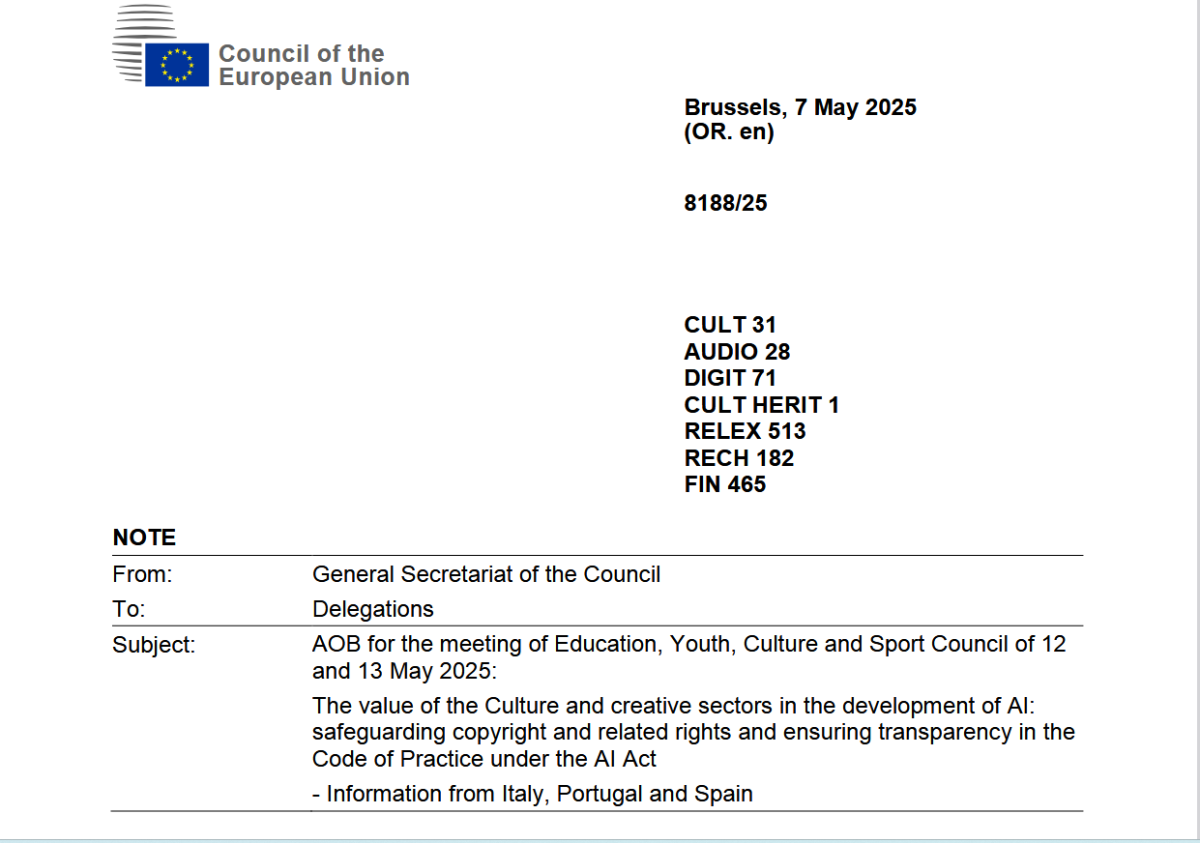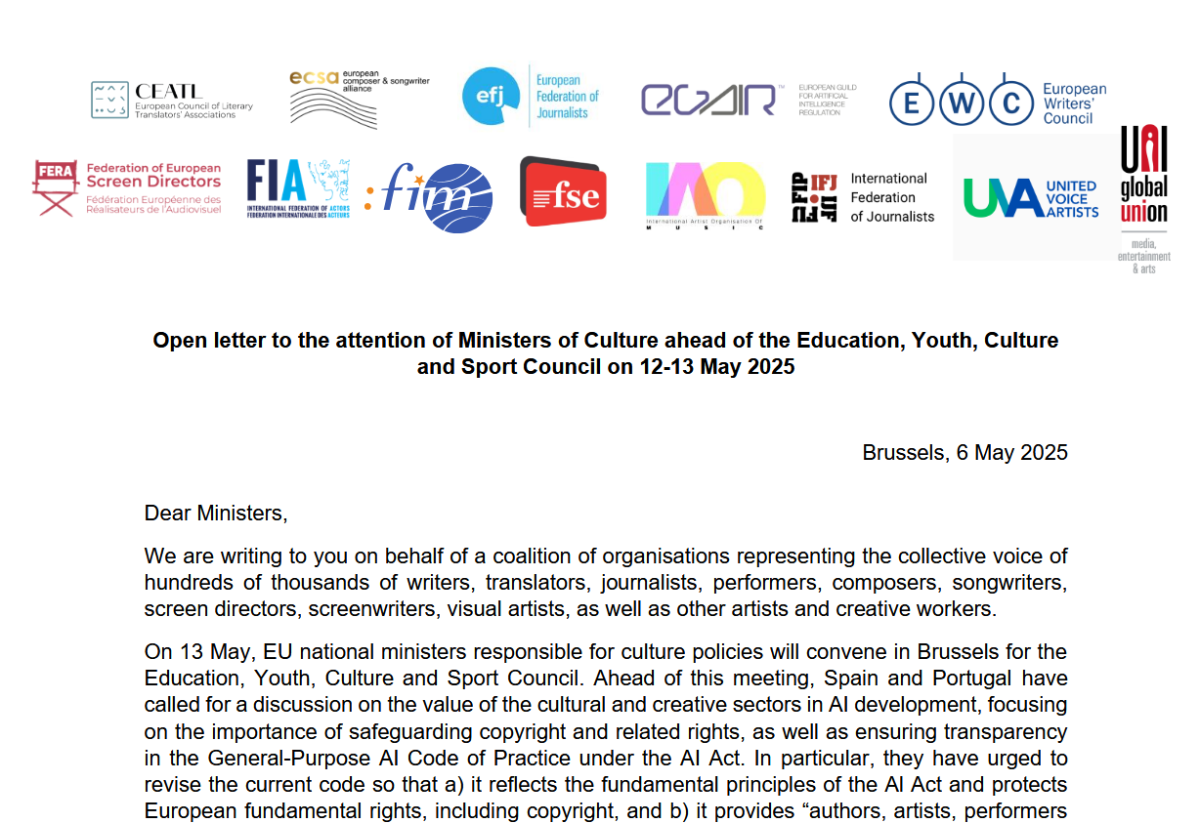Portugal, Spain and Italy are putting the protection of artists' copyrights and the revision of the current Code of Practice under the AI Act on the agenda of the meeting of Culture Ministers in the framework of the Education, Youth, Culture and Sport Council on 12-13 May in Brussels. At the same time, artists' coalitions are stepping up the pressure on EU Culture Ministers and the Commission to take action.
In a note sent by the three countries to the Council, they introduce to the ministerial meeting, outside the planned agenda, the issues of the value of culture and the creative sectors in the development of AI, and the need for transparency and protection of intellectual property rights in the code of practice under the AI Act. In the note they argue for prior authorisation by rights holders for the use of their works in the training of AI models, which if enacted is expected to affect the exercising of the opt-out right provided for in the DSM Directive (Directive 2019/790). They also propose to work closely with the bodies responsible for implementing the AI Regulation in order to promote solid European cooperation on the protection of fundamental rights in the context of artificial intelligence.

Οrganisations and alliances of artists, are reacting positively to this development, as they have long argued that generative AI models are now being trained without any transparency on their members' works, and that personal data is being scraped and copied from the Internet without any authorisation or remuneration to the creators.
A coalition of stakeholders including the Federation of European Screen Directors, the European Composer & Songwriter Alliance, the European Writers Council and many others have sent an open letter to the European Ministers of Culture expressing their support for the initiative of three countries (Portugal, Spain and Italy) to include the issue of the safeguarding of authors' rights in the upcoming ministerial discussion. They also call for a democratic debate on the impact of generative AI on human artistry and on the cultural and creative sector as a whole, ahead of the AI strategy for the cultural and creative sector and the Cultural Compass initiatives announced by the European Commission.

At the same time the Creators for Europe United, an alliance of authors, musicians, actors, filmmakers, photographers, illustrators, composers, designers, architects, journalists, translators, artists, producers, publishers and representatives of the media and cultural industries form all over Europe published a letter of defense of the cultural force of Europe against “political forces that want to weaken Europe, states that want to divide Europe and companies that treat Europe’s creative and intellectual heritage as a mere resource”.
The note that Portugal, Spain and Italy sent to the council recognises that the rapid and widespread adoption of General Purpose Artificial Intelligence (GPAI) has created opportunities and challenges in the European context, particularly in the cultural and audiovisual sectors. These challenges relate to "respect for fundamental rights, in particular copyright and related rights".
In August, specific provisions of the European regulation on artificial intelligence will enter into force and the code of practice will soon be finalised.
In this context, and taking into account the horizontal importance of the issue for the European cultural and creative sector, the three countries consider it necessary for Member States to address it at the level of Ministers of Culture and highlight four aspects of the issue which they regard as fundamental.
- The increasing use of GPAI models has had a profound impact on the cultural and creative industries, both economically and legally, creating new challenges for the protection and management of copyright. An adequate and timely response to these challenges is essential to ensure Europe's economic viability and cultural diversity, while safeguarding the rights of authors and related rights holders.
It is crucial to ensure a concerted and coherent approach among Member States in monitoring the application of the Code, so that lessons can be learned and insights can be gained that will help to establish robust principles for the future, ensuring greater effectiveness in the protection of copyright and creative rights, ensuring that the European Union takes a clear and solid stance vis-à-vis global operators, and promoting a fair and sustainable competitive environment.
- Fundamental issues such as prior authorisation by rights holders for the use of their works, including the express possibility of exercising the opt-out right provided for in the DSM Directive (Directive 2019/790), the application of clear and specific contractual models, and absolute transparency regarding data used in GPAI models, are essential to avoid future litigation and legal uncertainty. This transparency requires the mandatory adoption of unique identifiers (such as ISBN or ISRC) in summaries of used data (according to the specifications of the template to be provided by the AI Office, Art.53 (1) (d) of the AI -Act), thus enabling rights holders to fully exercise their rights while ensuring confidence and providing legitimacy in technological development.
- The ministerial discussion will also enable complete alignment of the developing Code of Practice with existing European legislation, notably the DSM Directive (Directive 2019/790) and the AI Regulation itself. Legislative and value coherence will strengthen legal certainty and respect for fundamental rights, economic and social justice, and equity among all stakeholders in the cultural and creative sector.
Given the technical and legal complexity of the issue, as well as its strategic importance for the future of the European cultural industries, the three countries introducing the topic consider it essential to undertake this approach at ministerial level in order to facilitate an in-depth and transversal discussion and to promote solid European cooperation on the protection of fundamental rights in the context of artificial intelligence. They also propose that this approach should be closely coordinated with the bodies responsible for implementing the AI Regulation, in particular the AI Board and the AI Office.
Photo source










